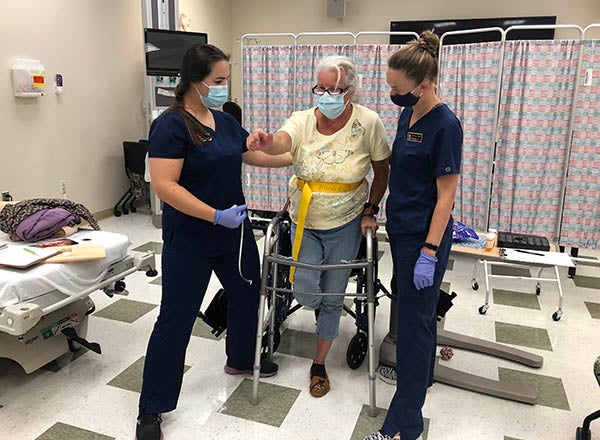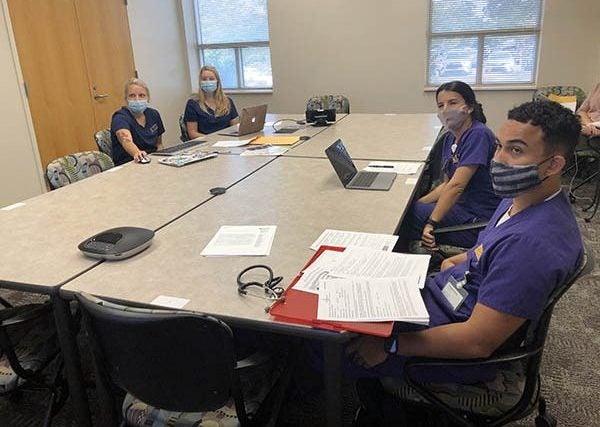ECU nursing, physical therapy students team up for patient-centered training

Physical therapy students work with a simulated patient during an interprofessional training event with the College of Nursing. (Contributed photos)
A new partnership between the East Carolina University colleges of Allied Health Sciences and Nursing recently provided students the opportunity to experience firsthand the benefits of interprofessional health care delivery and how it can translate to better outcomes for their future patients.
Small teams of physical therapy and nursing students were presented with identical “home visit” scenarios involving patients with leg amputations. The teams needed to work together to provide the patients with a comprehensive and shared plan of care.
The physical therapy and nursing students participated in a simulated home visit experience using standardized patients from ECU’s Office of Clinical Skills, Assessment and Education. Lab space within the College of Nursing and Department of Occupational Therapy were set up as a simulated home environment to provide students the opportunity to practice and apply dimensions of care in a home setting.
The students provided care to the patient based on their professional specialty, and assured patients that students from the other discipline would be along to do further assessments. This provided the students an opportunity to hone their craft, while gaining a better understanding of the role of their healthcare counterparts.
“We wanted the students to play to their strengths,” said Dr. Ryan D. Wedge, an assistant professor in the Department of Physical Therapy. “When people can bring their strengths to the table, but are aware what the others do, it leads to the best overall results. And the hopes are that it leads to more efficient and cost-effective care for the patients in the end.”
After spending about 45 minutes with the patients, the nursing and physical therapy students met in a classroom to design a shared plan of care for an interactive session during which they shared and discussed their different perspectives.
“It was really interesting to see where our roles overlapped, but also where they are very different. For example, the nursing students mentioned things that they got from our patient that I never would have thought to ask but were really important pieces of information,” said Heather Hubeli, a second-year PT student and Mount Holly native. “Now that I know more about how they are experts in this area, I can be more confident in what I am doing and when I need to refer out, I’ll know more about where I am sending my patients to. I think this will help us to provide better care for our patients.”
Lucas Johnson, a senior nursing student from Fayetteville, said the event felt more like a “real-world experience” than some other training simulations he has taken part in because of the opportunity to collaborate with people from different professions.

Physical therapy and nursing students collaborate during a debriefing session of an interprofessional training event between the ECU colleges of Allied Health Sciences and Nursing.
“My peers and I usually have a nursing mindset because we’re focused on what we learn in class and what taking care of people means for us. But those other professions are focused on something different, and I really think we learned a lot about their role in the health care team during this experience,” Johnson said. “We were more focused on helping the patient with things like their medications and nursing interventions, whereas PT was focused on mobility and getting the patient back to being able to do their daily living activities.”
The exercise was the result of several months of planning between faculty from both programs because they understood the importance of learning how to work with other professional disciplines effectively.
“We want to make sure there is quality care and comprehensive care that maximizes patient healing and patient potential,” said Sharon Mallette, clinical course coordinator for the College of Nursing. “And we want our students to learn how to communicate about the roles of each discipline, when to consult with each discipline and how it is paramount in ensuring the patients heal properly and get the right service delivered to them.”
By exposing the students to scenarios in which they must collaborate with multiple professionals across systems of care, faculty said it will better prepare the students to practice in a health care industry that is growing increasingly complex.
“We appreciate and value the different perspectives, but it’s also really about having shared goals and shared decision making,” said Stephanie Hart, a clinical assistant professor for the College of Nursing. “Interprofessional collaborative practice requires mutual respect and teamwork to provide high quality care that is very person centered.”
Faculty from both colleges said this event will be beneficial to the students long into the future because they will encounter the other health care disciplines in their professional lives and will be able to apply the teamwork concepts learned during this simulation toward positive outcomes.
The benefits of this interprofessional collaboration could one day also extend beyond simulated settings and into real-world opportunities, the faculty members added, with the goal of students eventually being able to train while collaborating to provide care for actual community members in need.